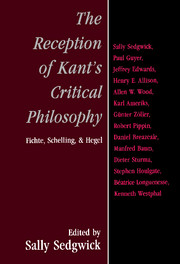Book contents
- Frontmatter
- Contents
- Notes on the Contributors
- Acknowledgments
- Introduction: Idealism from Kant to Hegel
- 1 The Unity of Nature and Freedom: Kant's Conception of the System of Philosophy
- 2 Spinozism, Freedom, and Transcendental Dynamics in Kant's Final System of Transcendental Idealism
- 3 Is the Critique of Judgment “Post-Critical”?
- 4 The “I” as Principle of Practical Philosophy
- 5 The Practical Foundation of Philosophy in Kant, Fichte, and After
- 6 From Critique to Metacritique: Fichte's Transformation of Kant's Transcendental Idealism
- 7 Fichte's Alleged Subjective, Psychological, One-Sided Idealism
- 8 The Spirit of the Wissenschaftslehre
- 9 The Beginnings of Schelling's Philosophy of Nature
- 10 The Nature of Subjectivity: The Critical and Systematic Function of Schelling's Philosophy of Nature
- 11 Substance, Causality, and the Question of Method in Hegel's Science of Logic
- 12 Point of View of Man or Knowledge of God: Kant and Hegel on Concept, Judgment, and Reason
- 13 Kant, Hegel, and the Fate of “the” Intuitive Intellect
- 14 Metaphysics and Morality in Kant and Hegel
- Bibliography
- Index
10 - The Nature of Subjectivity: The Critical and Systematic Function of Schelling's Philosophy of Nature
Published online by Cambridge University Press: 03 December 2009
- Frontmatter
- Contents
- Notes on the Contributors
- Acknowledgments
- Introduction: Idealism from Kant to Hegel
- 1 The Unity of Nature and Freedom: Kant's Conception of the System of Philosophy
- 2 Spinozism, Freedom, and Transcendental Dynamics in Kant's Final System of Transcendental Idealism
- 3 Is the Critique of Judgment “Post-Critical”?
- 4 The “I” as Principle of Practical Philosophy
- 5 The Practical Foundation of Philosophy in Kant, Fichte, and After
- 6 From Critique to Metacritique: Fichte's Transformation of Kant's Transcendental Idealism
- 7 Fichte's Alleged Subjective, Psychological, One-Sided Idealism
- 8 The Spirit of the Wissenschaftslehre
- 9 The Beginnings of Schelling's Philosophy of Nature
- 10 The Nature of Subjectivity: The Critical and Systematic Function of Schelling's Philosophy of Nature
- 11 Substance, Causality, and the Question of Method in Hegel's Science of Logic
- 12 Point of View of Man or Knowledge of God: Kant and Hegel on Concept, Judgment, and Reason
- 13 Kant, Hegel, and the Fate of “the” Intuitive Intellect
- 14 Metaphysics and Morality in Kant and Hegel
- Bibliography
- Index
Summary
It is well known that transcendental idealism for Kant simply represents a critical idealism, one that draws the limits of knowledge in terms of the distinction between phenomena on the one hand and things in themselves on the other. According to Kant, the transcendental idealist can also be understood as an empirical realist who refuses to dissolve the duality between our experience and objects of our experience, and concedes the existence of objects independent of the subject. The Kantian doctrine of transcendental idealism, irrespective of its various possible forms and modifications, is specifically characterized by a fundamental dualist structure with regard to the distinction between the “given” and the “constituted.” It was precisely this dualism that represented the skandalon of philosophy for the post-Kantian idealists, one that had at all costs to be overcome, despite their recognition of the positive aspects of Kant's contribution.
The early German idealist attempts to articulate a philosophical system are all essentially monistic in character, expressly designed to translate the Kantian dualism into the terms of a monist theoretical model. Nonetheless, with his System of Transcendental Idealism of 1800 – conceived at a time when that dualism was already widely regarded as having been transcended – Schelling took up and modified the question concerning the relative opposition between idealism and realism. For according to Schelling, the concept of transcendental idealism is capable of opening up a perspective from which the opposition between realism and idealism can be seen to derive from a third moment or dimension.
- Type
- Chapter
- Information
- The Reception of Kant's Critical PhilosophyFichte, Schelling, and Hegel, pp. 216 - 231Publisher: Cambridge University PressPrint publication year: 2000
- 3
- Cited by



